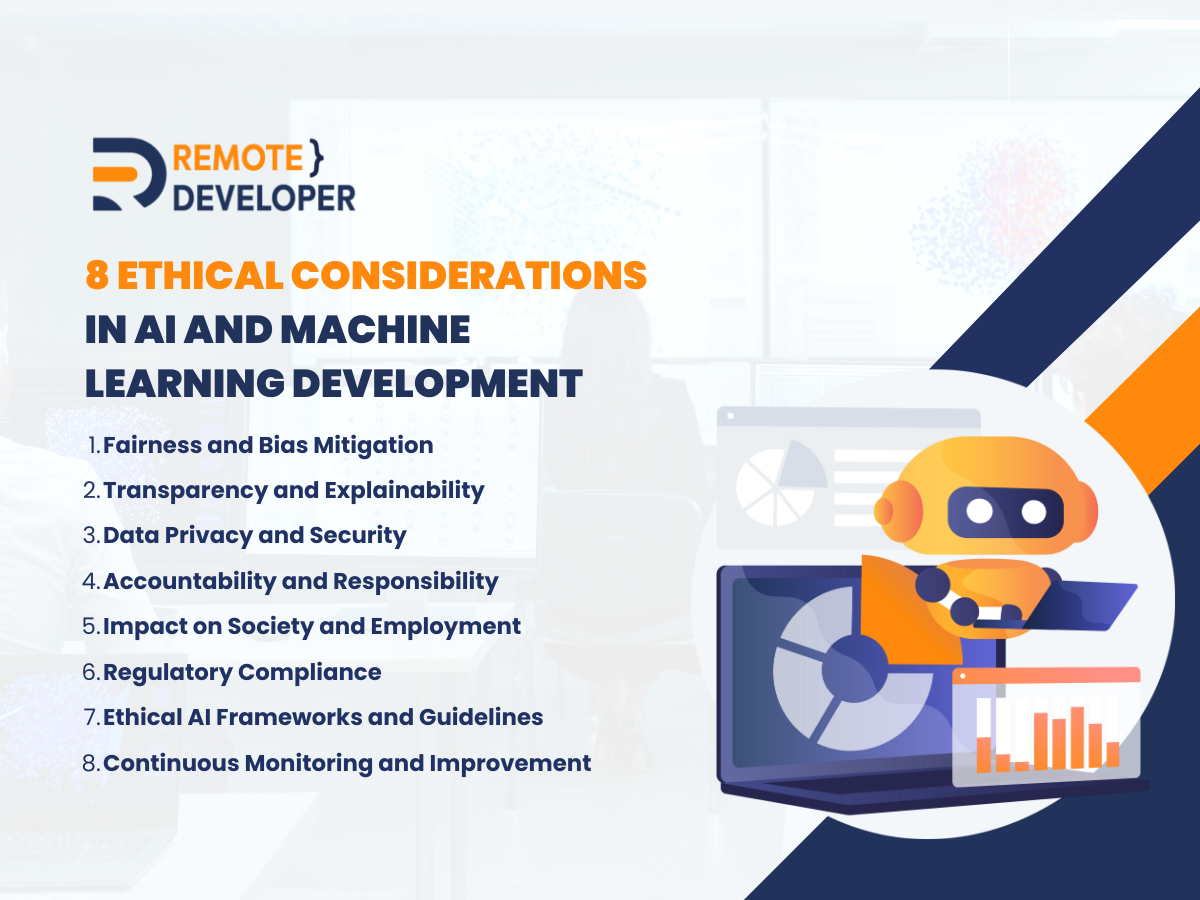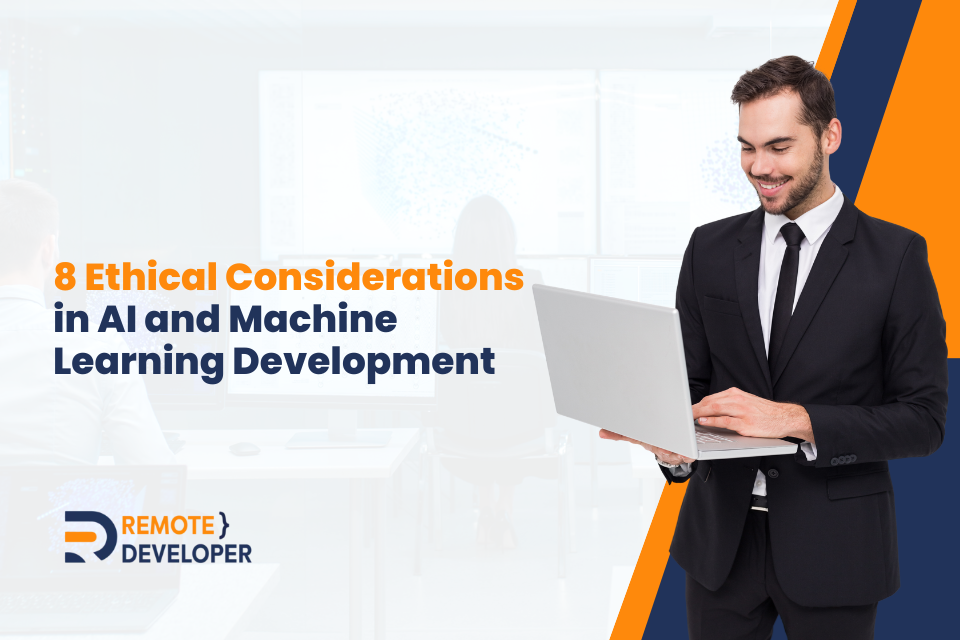Artificial Intelligence (AI) and Machine Learning (ML) have emerged as transformative technologies with the potential to reshape industries and societies. As these technologies advance, the ethical considerations surrounding their development, deployment, and use become increasingly critical.
This article will delve into eight ethical considerations in AI and ML development, shedding light on their significance and providing insights into why ethics are paramount in this field.
Why is Ethics Important in AI Development
In the rapidly advancing field of artificial intelligence (AI) development, it is crucial to prioritise ethics. As AI continues to shape our society and influence various aspects of our lives, it becomes imperative that we consider the ethical implications and responsibilities associated with its development and deployment.
Likewise, here are several compelling importance of ethics in artificial intelligence:
- Preserving Human Values. AI systems can impact various aspects of human life, from healthcare to finance, education, and beyond. Ethics ensure that AI aligns with human values and doesn’t cause harm or perpetuate biases.
- Avoiding Bias and Discrimination. AI algorithms can inadvertently perpetuate biases in the data they are trained on. Ethical AI development seeks to identify and mitigate these biases, promoting fairness and equality.
- Building Trust. Ethical AI practices are essential for building trust among users, stakeholders, and the public. Trust is crucial for AI adoption and acceptance.
- Legal and Regulatory Compliance. Many countries are enacting AI regulations that require ethical considerations in AI development. Non-compliance can lead to legal consequences and reputational damage.
- Preventing Unintended Consequences. Ethical AI development aims to anticipate and mitigate unintended consequences, such as job displacement or privacy breaches, ensuring the technology benefits society.
8 Ethical Considerations in AI and Machine Learning Development

1. Fairness and Bias Mitigation
Fairness and bias are some of the most critical considerations in ethical AI development. In AI, these refers to the equitable treatment of all individuals, regardless of their demographic characteristics. AI systems can inherit biases from training data, such as the following:
- Data Bias. Biased training data can lead to discriminatory outcomes.
- Algorithmic Bias. AI algorithms can inadvertently discriminate against certain groups.
- Fairness Metrics. Developers should use fairness metrics to evaluate AI models for prediction disparities across different demographic groups.
As such, developers must address these challenges to ensure equitable AI applications. Here are some tips to mitigate bias and create fairness in AI.
- Developers must carefully curate and pre-process data to minimise bias.
- Ongoing monitoring and fine-tuning are essential to detect and rectify algorithmic biases.
- These metrics help ensure equitable outcomes.
2. Transparency and Explainability
Transparency and explainability are crucial for ensuring that AI systems are understandable and accountable. Users and stakeholders need to know how AI makes decisions, especially in high-stakes applications like healthcare or finance.
- Model Interpretability. Developers should prioritise the use of interpretable models whenever possible. These models allow for a better understanding of how decisions are reached. In situations where complex models are necessary, additional steps should be taken to provide explanations.
- Explainability Techniques. Several techniques exist to make AI models more interpretable. Methods like LIME (Local Interpretable Model-agnostic Explanations) and SHAP (SHapley Additive exPlanations) offer ways to explain model predictions.
- Black Box Mitigation. Some AI models are inherently black boxes, so efforts are ongoing to make them more interpretable. Feature importance scores, decision attribution methods, and rule-based post-processing are some strategies to enhance transparency.
3. Data Privacy and Security
Data security is one of artificial intelligence’s most important ethical considerations. Protecting data privacy and security is a fundamental ethical consideration in AI development. Mishandling data can lead to privacy breaches and unauthorised access, causing harm to individuals.
Likewise, protecting sensitive information is essential to uphold data privacy and security principles. Here are some ways to ensure data privacy and security in AI.
- Data Anonymisation. Personal data should be anonymised to protect individual privacy. Data minimisation principles should also be followed.
- Secure Data Storage. Adequate security measures must be in place to protect data from breaches, ensuring that sensitive information remains confidential.
- Consent and Transparency. Users should be informed about data collection and usage, and their permission should be obtained when necessary.
4. Accountability and Responsibility
AI developers, organisations, and users must be accountable for the technology’s outcomes. Clear lines of responsibility should be established to address any harm or misuse of AI systems.
- Ethical Frameworks. Organisations should adopt ethical AI development frameworks that define responsibilities and guidelines for AI development and deployment.
- Ethics Committees. Establishing ethics committees or review boards can help evaluate and oversee AI projects to ensure ethical compliance.
- Liability. Legal and ethical considerations should determine liability for AI-related harm or errors.
5. Impact on Society and Employment
Another ethical AI development consideration that we should remember is its impact on society. AI can lead to job displacement and economic disparities. Ethical AI development should strive to minimise adverse societal effects. Here are some solutions to mitigate this issue:
- Reskilling and Upskilling. Investing in reskilling and upskilling programs can help mitigate job displacement, ensuring workers can adapt to the changing job landscape.
- Universal Basic Income (UBI). Some advocate for UBI to provide financial stability to individuals affected by job loss due to AI.
- Socioeconomic Equity. Ethical AI should reduce disparities and promote equitable access to AI benefits.
6. Regulatory Compliance
AI development must adhere to local and international regulations. Regulations and guidelines are emerging to govern AI use, and developers must ensure compliance.
- GDPR Compliance. AI systems must adhere to the General Data Protection Regulation (GDPR) when processing personal data in the European Union.
- Ethical AI Standards. Developers should adhere to ethical AI standards, such as those outlined by the IEEE or ACM.
- Country-Specific Regulations. Regulations vary by country; developers must stay informed and comply with relevant laws.
7. Ethical AI Frameworks and Guidelines
Ethical AI frameworks and guidelines provide a structured approach to ethical considerations in AI development. These frameworks help developers navigate complex moral terrain and make informed decisions.
- AI Ethics Principles. Develop and adhere to a set of AI ethics principles that guide all stages of AI development.
- AI Impact Assessment. Conduct an AI impact assessment to evaluate potential ethical risks and benefits.
- Stakeholder Engagement. Involve diverse stakeholders, including ethicists, in the development process to ensure a well-rounded perspective.
8. Continuous Monitoring and Improvement
Ethical considerations in AI do not end at deployment; continuous monitoring and improvement are necessary to adapt to evolving ethical challenges. AI systems and policies must adapt as technology and societal norms evolve. Here are some ways you can monitor and improve:
- Feedback Loops. Implement feedback loops to collect user feedback and identify potential ethical issues in real-world usage.
- Ethical Audits. Periodically conduct ethical audits to assess AI systems for compliance with ethical guidelines and principles.
- Adaptive Ethics. Be prepared to adapt AI systems and policies in response to changing ethical norms and societal values.
Conclusion
Ethical considerations in AI and ML development are paramount, shaping the responsible use of these transformative technologies. From ensuring fairness and transparency to protecting data privacy and addressing societal impacts, these considerations guide developers in building AI systems that align with human values and benefit society. As AI advances, a steadfast commitment to ethics will be crucial in navigating the complex ethical landscape of AI development.
To learn more about ethical AI development or seek guidance on ethical AI implementation, contact us at Remote Developer.

